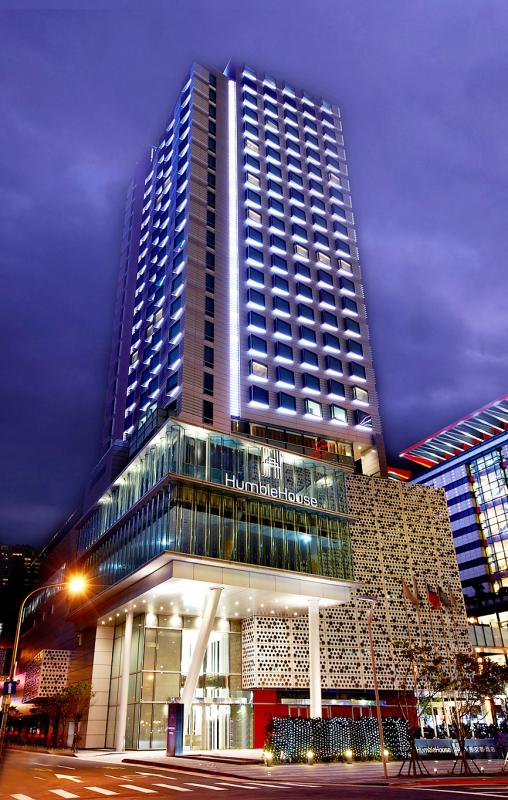Luxury hotel operator My Humble House Hospitality Management Consulting Co (寒舍餐旅) on Tuesday reported a net loss of NT$260 million (US$9.34 million) for last quarter, widening sharply from last quarter and a year earlier, as restrictions amid a COVID-19 outbreak took a heavy toll on its operations.
The nationwide level 3 alert, with its accompanying ban on dine-in services, stifled business at the group, which runs Le Meridien Taipei (台北寒舍艾美酒店) and Humble House Taipei (寒舍艾麗) in Xinyi District (信義), Sheraton Grand Taipei Hotel (台北喜來登大飯店) near Taipei Railway Station and hot spring resort Mu Jiaosi Hotel (礁溪寒沐) in Yilan County.
The latest financial result indicated losses per share of NT$2.33, much worse than losses per share of NT$0.6 in the first quarter and NT$0.7 a year earlier, the company said in a statement.

Photo courtesy of Humble House Taipei via CNA
The spike in local infections since May dashed earlier hopes that it might swing to a profit this year on the back of a sustained boom in domestic tourism.
Escalating global infections caused by the Delta variant of SARS-CoV-2 have raised doubt that the government would lift border controls any time soon.
Food takeout services and collaboration with e-commerce companies have helped mitigate the pain amid the restrictions, the conglomerate said, adding that it once sold 3,300 boxed meals a day, and reached out to new customers by selling dishes and cakes via 7-Eleven convenience stores.
EXPECTING IMPROVEMENT
The situation might improve this quarter after the government allowed conditional in-dining services this month, it said.
The group said it is to initially woo small-group tourists, and aims to launch stronger promotion campaigns to boost guestroom and food and beverage sales once authorities bring the outbreak under control.

Nvidia Corp CEO Jensen Huang (黃仁勳) today announced that his company has selected "Beitou Shilin" in Taipei for its new Taiwan office, called Nvidia Constellation, putting an end to months of speculation. Industry sources have said that the tech giant has been eyeing the Beitou Shilin Science Park as the site of its new overseas headquarters, and speculated that the new headquarters would be built on two plots of land designated as "T17" and "T18," which span 3.89 hectares in the park. "I think it's time for us to reveal one of the largest products we've ever built," Huang said near the

China yesterday announced anti-dumping duties as high as 74.9 percent on imports of polyoxymethylene (POM) copolymers, a type of engineering plastic, from Taiwan, the US, the EU and Japan. The Chinese Ministry of Commerce’s findings conclude a probe launched in May last year, shortly after the US sharply increased tariffs on Chinese electric vehicles, computer chips and other imports. POM copolymers can partially replace metals such as copper and zinc, and have various applications, including in auto parts, electronics and medical equipment, the Chinese ministry has said. In January, it said initial investigations had determined that dumping was taking place, and implemented preliminary

Intel Corp yesterday reinforced its determination to strengthen its partnerships with Taiwan’s ecosystem partners including original-electronic-manufacturing (OEM) companies such as Hon Hai Precision Industry Co (鴻海精密) and chipmaker United Microelectronics Corp (UMC, 聯電). “Tonight marks a new beginning. We renew our new partnership with Taiwan ecosystem,” Intel new chief executive officer Tan Lip-bu (陳立武) said at a dinner with representatives from the company’s local partners, celebrating the 40th anniversary of the US chip giant’s presence in Taiwan. Tan took the reins at Intel six weeks ago aiming to reform the chipmaker and revive its past glory. This is the first time Tan

CUSTOMERS’ BURDEN: TSMC already has operations in the US and is a foundry, so any tariff increase would mostly affect US customers, not the company, the minister said Taiwanese manufacturers are “not afraid” of US tariffs, but are concerned about being affected more heavily than regional economic competitors Japan and South Korea, Minister of Economic Affairs J.W. Kuo (郭智輝) said. “Taiwan has many advantages that other countries do not have, the most notable of which is its semiconductor ecosystem,” Kuo said. The US “must rely on Taiwan” to boost its microchip manufacturing capacities, Kuo said in an interview ahead of his one-year anniversary in office tomorrow. Taiwan has submitted a position paper under Section 232 of the US Trade Expansion Act to explain the “complementary relationship” between Taiwan and the US